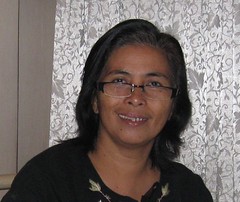
(Ms. Luisita Esmao, or Ate Sita as we call her, is a widow, rice and coconut farmer from the town of Tayabas, province of Quezon, in the Philippines. She is also President of LAKAMBINI or Lakas ng Kababaihan sa Kanayunan [Strength of Women in the Countryside], a national organization of small scale women farmers in the Philippines. LAKAMBINI is the women’s organization affiliated with PAKISAMA or Pambansang Kilusan ng mga Samahang Magsasaka [National Movement of Peasant Movements], a national confederation of small scale farmers, fishers and IP organizations in the country. PAKISAMA is a member of AFA.)
1. How does Climate Change affect women farmers and how can they better adapt to it?
As a whole, climate change will decrease soil potential and lessen produce. Women who prepare food on the table will find it more difficult to ensure nutritious and adequate food for the family. For women in rice-farming communities who are in charge of sowing seedlings during the planting season, drought will mean even less opportunity for them to be employed as farm labor. In general, women augment farm income by getting employed as hired labor and there will be less opportunities when climate change worsens farming potential. Women can adopt by intensifying backyard food production but this will mean more support for basic services like water for the homes and additional nutritional supplements for the children.
2. Why you think is it important to consider and deal with Climate Change effects in different productive systems — seeds, natural resources, fisheries, livestock? How can bio-resources be enhanced to avoid the extreme effects of climate change?
Productive systems are linked and the depletion and contamination of one productive system will inevitably affect another (eg. Farm fertilizer residues find their way in the rivers and seas). One way of enhancing bio-resources is to practice sustainable agriculture. For example, LAKAMBINI as a women-farmer organization is actively lobbying against the patenting of seeds. Women in the rural areas have traditionally been the keepers of seeds, and by sharing seeds among themselves, biodiverse growth and development are ensured. However, the recent move by big corporations to patent seed will take away this role from women and will endanger biodiversity. There should be less application of GMOs, pesticides and fertilizers to ensure a more sustainable ecosystem for the future generation.



Comments are closed